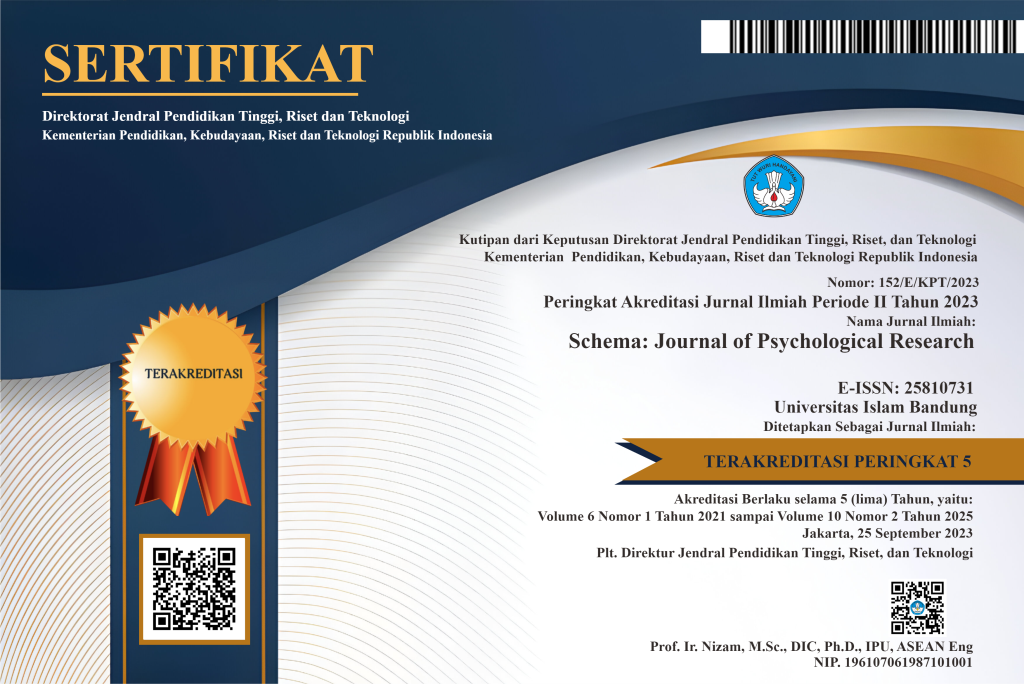HUBUNGAN ANTARA HEALTH LOCUS OF CONTROL DAN SELF EFFICACY BERHENTI MEROKOK PADA MAHASISWA KEPERAWATAN YANG MEROKOK
Abstract
Mahasiswa keperawatan diharapkan memiliki kontrol perilaku sehat yang baik. Namun, masih terdapat data-data mengenai perilaku merokok pada mahasiswa keperawatan. Hal ini disebabkan oleh kurangnya kesadaran mereka untuk mengontrol kesehatan. Health locus of control merupakan salah satu aspek psikologis untuk mengetahui perilaku sehat individu. Selain itu, self efficacy juga dirasa memiliki peranan yang penting dalam usaha berhenti merokok. Penelitian ini bertujuan untuk melihat apakah terdapat hubungan antara health locus of control dan self efficacy berhenti merokok pada mahasiswa keperawatan yang merokok. Partisipan dalam penelitian ini merupakan mahasiswa keperawatan yang berusia 18-25 tahun sebanyak 139 orang. Penelitian ini menggunakan skala MHLoC untuk mengukur health locus of control, dan menggunakan skala SEQ-12 untuk mengukur self efficacy untuk berhenti merokok pada partisipan penelitian. Hasil penelitian ini menunjukkan bahwa terdapat hubungan positif antara internal health locus of control dan internal smoking self efficacy (r=0,384, ρ=0,000), chance health locus of control dan external smoking self efficacy (r=0,284, ρ=0,001), dan antara powerful others health locus of control dan internal smoking self efficacy (r=0,406, ρ=0,000) dan external smoking self efficacy (r=0,282, ρ=0,001) pada mahasiswa keperawatan yang merokok.
Keywords
Full Text:
PDF (Bahasa Indonesia)References
Abdolmanafi, A., Besharat, M.A., Farahani, H., & Khodaii, M.R. (2011). The moderating role of locus of control on the relationship between anger and depression in patients with major depression disorder. Procedia: Social and Behavioral Sciences. 30 (2011) 297-301.
Abdolmanafi, A., Besharat, M.A., Farahani, H., & Khodaii, M.R. (2011). The moderating role of locus of control on the relationship between anger and depression in patients with major depression disorder. Procedia: Social and Behavioral Sciences. 30 (2011) 297-301.
Astuti, T.P., dan Hartati, S. (2013). Dukungan sosial pada mahasiswa yang sedang menyusun skripsi (studi fenomenologis) pada mahasiswa fakultas psikologi UNDIP. Jurnal Psikologi Undip. Vol. 12 No. 1 April 2013.
Condiotte & Lichtenstein. (1981). Self-efficacy and relapse in smoking cessation programs. Journal of Consulting and Clinical Psychology, Vol 49(5), Oct 1981, 648-658.
Etter, J.-F., Bergman, M. M., Humair, J.-P., & Perneger, T. V. (2000). Development and validation of a scale measuring self-efficacy of current and former smokers. Addiction, 95(6), 901-913.
Fernandez Garcia, D., V. Martin Sanchez, et al.(2007) Tobacco use amongst nursing and physiotherapy students a cross sectional questionnaire survey. International Journal of Nursing Studies, 44(5), 780- 785.
Kusuma, A. R. P. (2012)., Pengaruh merokok terhadap kesehatan gigi dan rongga mulut. Kedokteran Gigi Universitas Islam Sultan Agung, Majalah Ilmiah Sultan Agung, 49 (124): 122-19.
Mackay, J., & Eriksen, M. (2002). The tobacco altas. London WHO. Switzerland: Myriad, 2002: 18-36.
Melani A.S., Verponziani W., Boccoli E., Federici A. & Sestini P. (2000) Tobacco smoking habits, attitudes and beliefs among nurse and medical student. European Journal of Epidemiology 16: 607-611, 2000
Mujtaba, A., Malik,F., Iftikhar,R. (2015). Anger, depression and locus of control among heavy smokers, cannabis users and heroin addicts. The International Journal of Indian Psychology vol 3, Issue 1, No.6. ISSN 2348-5396(e)
Patelarou et al. (2011). Nursing education and beliefs towards tobacco cessation and control: a cross- sectional national survey (GHPSS) among nursing students in Greece. Tobacco Induced Diseases 2011, 9:4.
Patkar, Ashwin A.,Kevin Hill, Vikas Brata, Michael J. Vergare and Frank T. Leone. (2003), A Comparison of smoking habits among medical and nursing student. Proquest Journal. 4 (124) : 1417.
Piko B.F. (2002) Does knowledge count- Attitudes toward smoking among medical, nursing, and pharmacy students in Hungary. Journal of Community Health 27, 269–276.
Schwarzer & Luszczynska. (1988). Perceived self-efficacy.
Stuart,K., Borland,R., McMurray, N,. (1994). Self-efficacy, health locus of control, and smoking cessation. Addictive Behaviors. Vol. 19. No. I. DD. I-I2. 1994
Wallston, B.S., & Wallston. K.A. (1982). “Health Locus of Control Scale”. Research with the Locus of Control Construct (vol. 1): Assessment Methods.
Wallston, K.A., Wallston B.S., & DeVellis, R. (1978). Development of the multidimensional health locus of control (MHLC) scales. Health Education Monographs, 6(2). 160-170.
DOI: https://doi.org/10.29313/schema.v0i0.3388
Refbacks
- There are currently no refbacks.
Indexed by:
This work is licensed under a Creative Commons Attribution-NonCommercial-ShareAlike 4.0 International License.












